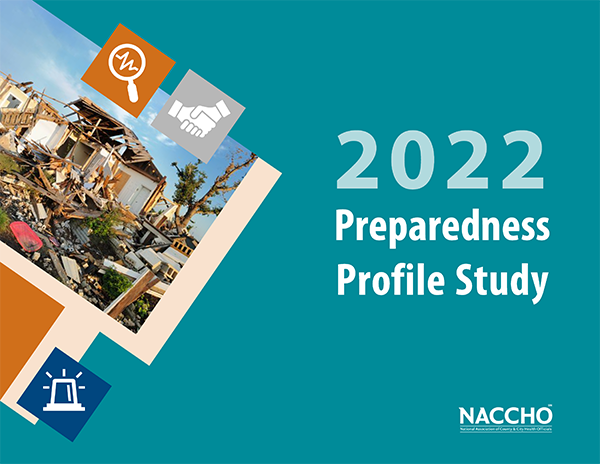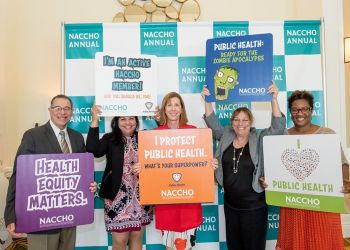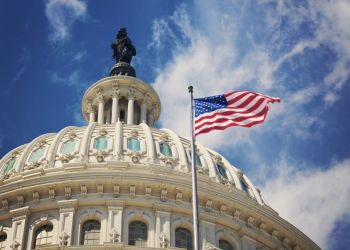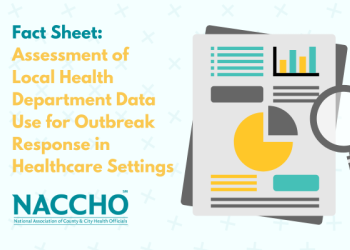Washington, DC, September 29, 2023 – The COVID-19 pandemic has highlighted systemic public health workforce issues that existed even before the pandemic, according to a new report from the National Association of County and City Health Officials (NACCHO), which represents the nation’s nearly 3,000 local health departments. The study reveals opportunities for strengthening the local public health preparedness workforce to support proactive readiness for emerging and recurring threats, in addition to ongoing equitable community recovery efforts post-pandemic.
The Preparedness Profile assessment was conducted by NACCHO between April and May 2022. It was distributed to a nationally representative sample of local health departments across the nation to gather information about preparedness trends and emerging issues. The 2022 assessment provides one of the most comprehensive pictures of local public health preparedness capacity to inform priorities at the local, state, and national levels.
KEY SURVEY FINDINGS
Local Public Health Preparedness Workforce
Local health departments experienced an influx of new preparedness staff due to the COVID-19 response, and at the same time, the public health workforce is aging. This study underscores that retention of new and experienced public health professionals will require investment in programs like CDC’s Public Health Emergency Preparedness (PHEP) to support training and resources targeted at different skill levels, as well as an intentional investment in resourcing the hiring of dedicated, full-time preparedness staff to meet the needs of communities.
- In 2022, 28% of local health departments’ preparedness coordinators had fewer than two years of experience in the field—compared to 24% in 2018, while 36% have more than 11 years of experience in the field.
- More than half of local health departments (52%) reported their preparedness coordinators spend most of their jobs dedicated to duties other than preparedness.
- A quarter (25%) have formal mechanisms in place to reallocate financial resources to pay for staff during an emergency, and 21% have formal mechanisms to reduce time required to expedite hiring and reassigning.
Impacts of COVID-19 on Local Public Health Preparedness
The COVID-19 pandemic required an unprecedented level of public health response. Although challenging due to many years of chronic under-resourcing, the local response likely played a key role in improving preparedness planning for similar threats among local health departments. However, this study reveals the importance of increased training for local public health practitioners on working with at-risk and vulnerable populations to mitigate the disproportionately negative outcomes associated with emerging threats like COVID-19.
- More than half of local health departments (53%) reported that CDC’s PHEP funding and guidance strengthened their ability to conduct community recovery efforts in response to the COVID-19 pandemic.
- Approximately 4 in 5 local health departments (82%) are very prepared to respond to pandemics.
- Less than half of local health departments (43%) considered refugee/migrant populations in their preparedness planning efforts.
Preparedness Planning Capacity and Activities
Local health departments remain concerned about commonly recurring natural disasters due to their increased frequency and magnitude in recent years as the impacts of climate change, including extreme heat, flooding, and wildfires, worsen. Meanwhile, threats, such as opioid abuse and overdose and active shooter incidents, continue to be a top concern. Local health departments reported a lack of adequate funding to respond to complex and often simultaneous public health crises.
- Less than 1 in 4 local health departments (23%) conducted preparedness planning on climate change in 2022.
- Local health departments were more likely to report decreasing participation in preparedness activities related to climate change in 2022 (8%) than in 2018 (3%).
- More than 3 in 4 local health departments were very concerned (78%) about the impact of opioid use and overdoses in their communities, while also feeling unprepared (80%) to address that threat.
“As this assessment shows, local health departments play a critical role in responding to a range of complex, and often simultaneous public health emergencies,” said NACCHO Chief Executive Officer Lori Tremmel Freeman. “While demonstrating the capacity of local health departments to respond, the assessment also points out important gaps that impact national security. The need for sustained funding to support the public health workforce and infrastructure is evident and this report offers recommendations for national partners, states, and local health organizations to strengthen preparedness and response at the local level.”
Click here to download the full report.
# # #
About NACCHO
The National Association of County and City Health Officials (NACCHO) represents the nation’s nearly 3,000 local governmental health departments. These city, county, metropolitan, district, and tribal departments work every day to protect and promote health and well-being for all people in their communities. For more information about NACCHO, please visit www.naccho.org.
About the Preparedness Profile Survey
Since 2008, the Preparedness Profile survey has been conducted periodically to gain an understanding of the public health emergency preparedness landscape among local health departments. In 2022, the survey was distributed to a nationally representative sample of 985 local health departments. A total of 375 local health departments completed the survey (38% response rate).






